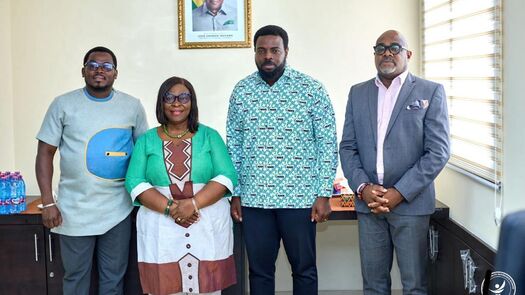December 15, 2025

Meet Cecilia Lodonu-Senoo
The Executive Director of Hope for Future Generations—the Global Health Advocacy Incubator’s (GHAI) lead immunization advocacy partner in Ghana—wears many hats. She is a nurse, a midwife, a public health academic and an advocate. Even as she engaged other delegates at the 77th World Health Assembly in Geneva, she sat with us to share her journey and the impactful work she does as the Executive Director of Hope for Future Generations, to ensure children receive life-saving vaccines. Discover her strategies to combat misinformation and her vision for vaccine independence in Ghana.
1) Why did you choose to work in the health space, especially immunization?
Child survival is a right, and we must respect their rights by giving them what is due them. My professional endeavors mirrored my passion for preventive health, especially primary health care and child survival. Access to immunization is one of the basic needs in a child’s life. I cannot imagine a child dying from diseases that can be prevented through immunization. It is for this reason l am an immunization advocate.
2) Can you describe a typical work week?
I work from dawn to dusk. I always have a very busy week. Effective planning is my strategy. I work on global boards with people from different time zones. However, I ensure my organizational goals and objectives are also achieved. I hold bi-weekly technical meetings with management. I try as much as possible to participate in our monthly general staff meetings even when l am not in Ghana. Staff have the opportunity to lead and this is where transition from the organization one day comes in. I am very lucky to have dedicated staff and a Board of Directors who continue to work very hard for the organization. We also tried to have strong internal controls backed with policies that we all follow.
3) Since the advent of Covid-19, social media platforms have been awash with disinformation and misinformation on vaccines which sometimes threaten to reverse progress made over the last 50 years. How do you navigate this difficult context in your immunization advocacy work in Ghana?
Despite the challenges, Covid-19 has also taught us innovation and efficiency. We have a very dedicated and skilled communication team. With guidance and technical support from GHAI, we have a good communication and advocacy strategy. I must say that this has improved our social media and all our communication interventions. We research and develop evidence-based advocacy messages that are approved by management before we go public. We put communication at the center of our work.
4) What impact will your work have on Ghana’s progress towards vaccine independence in the next five years?
We are monitoring immunization financing closely in Ghana. This project is timely and very strategic. It is yielding results despite the backlash for the advocacy we are doing. We know it will continue but our strategy is rather to partner with the government and all stakeholders, not to work as competitors. The issue is that many policymakers don't have access to reliable and relevant information that will help to make informed decisions. The FAIR project [funded by GHAI] has addressed the gap, we ensure key policymakers and all relevant partners have access to all the information to guide their decision on immunization financing and primary health care. Now, the policymakers are our champions for immunization financing in Ghana. We are hopeful that Ghana will effectively implement the transition roadmap towards self-financing of immunization services. This project has helped strengthen partnerships with different people. It is imperative to underscore the critical role of immunization in safeguarding the health and well-being of children. Vaccines are one of the most cost-effective and powerful tools in public health.



